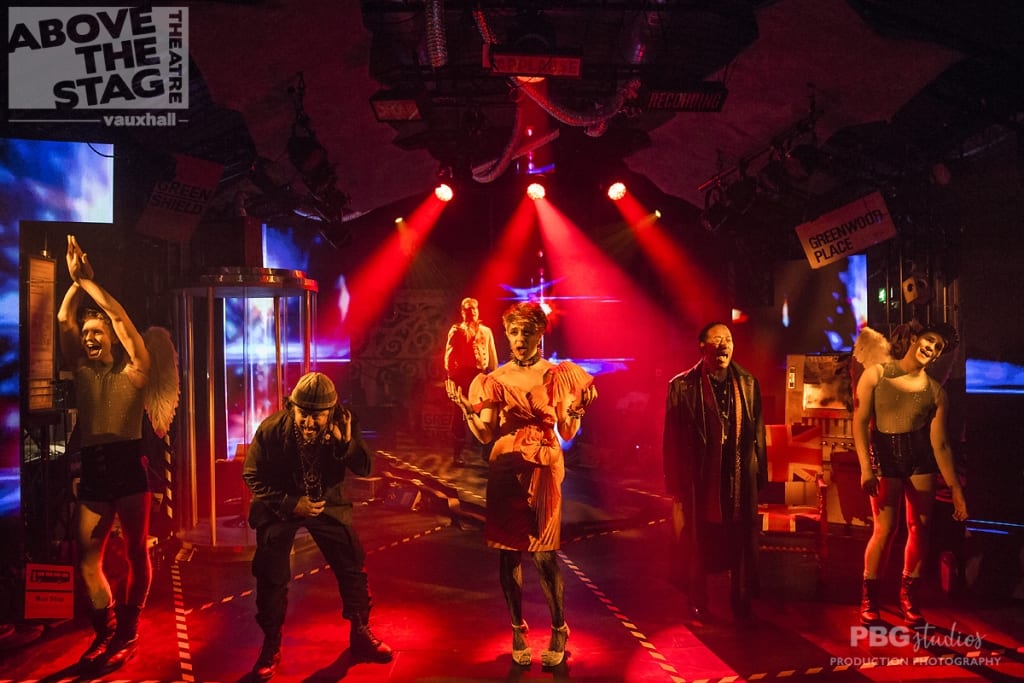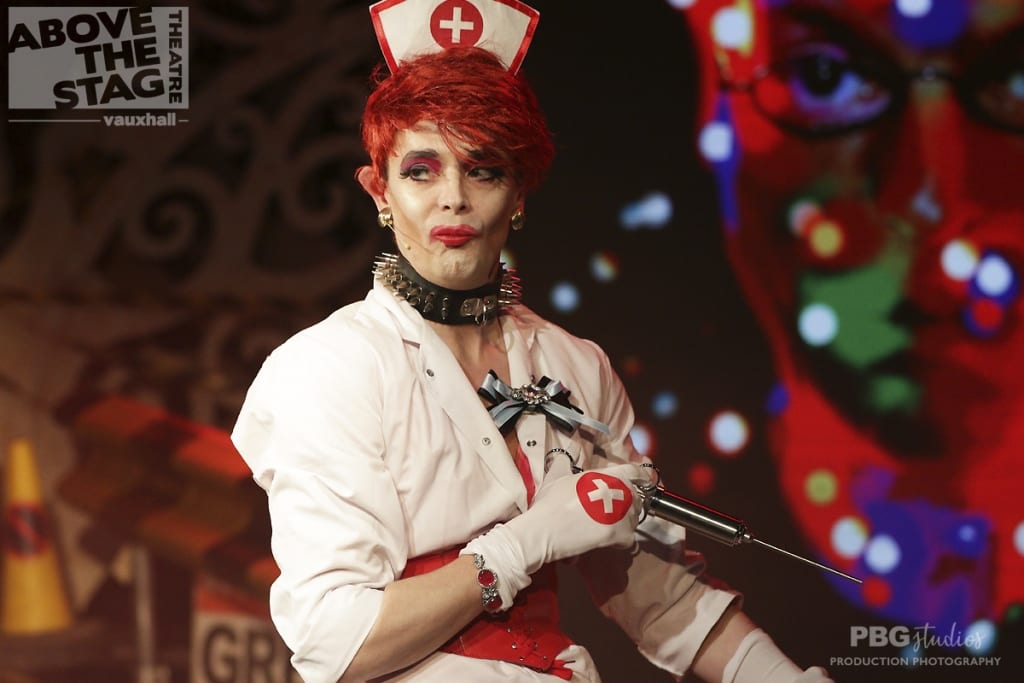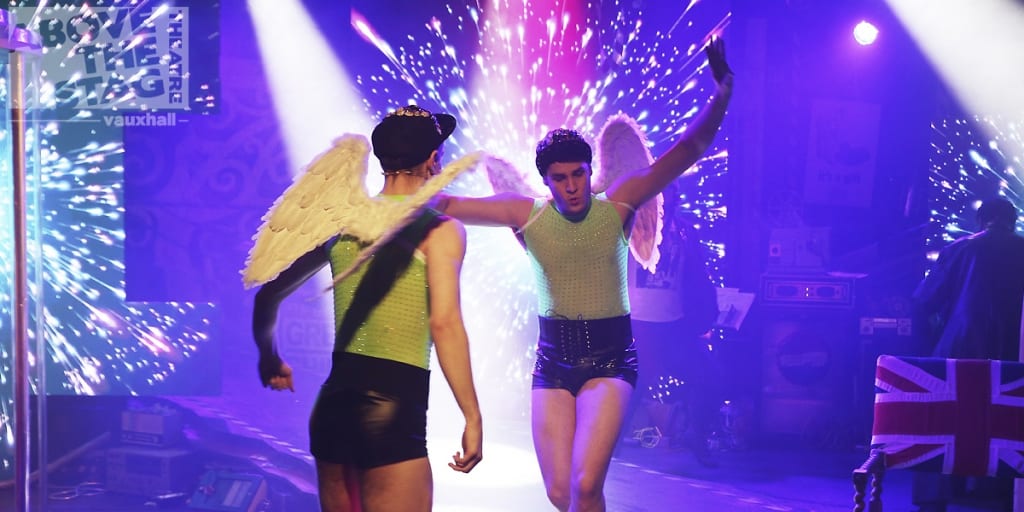Queereteria TV is the latest theatrical development in the life of Andy Bell’s melancholy and salacious stage persona Torsten. In this incarnation, we find Torsten the ‘semi-immortal polysexual’ taking the role of a caged songbird, forced to perform for broadcast entertainment. Lady Domina Bizarre (Matthew Baldwin), appearing as a slutty nurse crossed with the Joker, is the empress of this broadcast. She manipulates Torsten to play second fiddle to her by administering worryingly large quantities of mood-stabilising drugs.
In a post-apocalyptic world, where all other channels likely feature Test Card F, Queereteria TV is about what goes on behind the corrupt production of this cabaret brimming with singing, dancing and nostalgia about pre-disaster days. Queereteria TV is certainly niche theatre, firmly ticking the boxes of ‘weird’ and ‘queer’ – it’s Mitchell and Webb’s ‘The Quiz Broadcast’ meets Absolutely Fabulous.
I had the pleasure of talking to some the cast after the show to learn more about the production and their opinions on the show. Andy Bell conveyed his excitement at the idea of once again donning the Torsten hat:
NP: What made you foray into theatre?
AB: I haven’t totally moved into theatre because there’s still lots of music involved in the play. We’ve been going for about 7 years with this project and this is the third outing that we’ve had where I play Torsten. I just really enjoy the experience of recording this type of music because it’s so unusual compared to Erasure songs – pop is quite one-dimensional I think, you can play live thousands of times, but there’s nothing like being in a small theatre like this where the audience is right in front of you.
NP: As you say your involvement in this play is primarily musical. Why does this kind of hybrid musical and theatrical role appeal to you?
AB: It’s just a completely different exercise in singing. It’s not like singing pop because pop is like auto-singing and I know the songs off-by-heart and inside-out. Here the singing really takes mind concentration; the notes and cadences go to different places where I’d never think of going on my own as a songwriter. Having said that, this kind of work gears me up for writing with Vince because I get excited about seeing him again to collaborate.
Queereteria TV is a divergence from Torsten’s usually raunchy repertoire into more heartfelt and reflective songs about long-gone lovers. At the antithesis of his lyrical sentimentality is the distinctly hideous and dissonant Lady Domina Bizarre. This pantomime grand dame is the raspy and camp showstopper of Queereteria TV, reigning supreme as a long-crazed bitch who has huffed too much radioactive fallout. Matt Baldwin, de-dragged after the show and remarkably transformed into a svelte academic, talked a bit about preparing for this role and locking horns with the play’s complex Shakespearian verse:
NP: What was the process like of getting this show ready?
MB: It was very interesting – I didn’t know anything about the show and hadn’t seen any of the previous productions; there’s quite a fanbase. I knew Barney and Andy socially from here and I thought that they were cool and creative people, so when I knew they were coming back I thought well let me just throw my hat into the ring because I’ve done lots of work here as a pantomime dame; we do a filthy panto every year. I’m confident in drag but I don’t like putting it on – it’s an ordeal, glue in your eyes with the lashes and such, but once you’re in it you are given this amazing feeling of power with the stature from the heels. What also interested me about this piece Barney had written was that he was essentially sneaking Absurdist theatre into The Stag. I’ve worked at The Stag a lot and I love the pantomimes we do here around Christmas – we have a really strong core audience and they basically come to heckle me.
NP: This play is Absurdist and also Shakespearian in the weight of the verse don’t you think?
MB: Oh yes absolutely, but what helped me get through it was the flow that these lines have. It wasn’t like some of those Beckett shows where you have to learn gobbledegook. The tray bake monologue was a bit tricky to learn because it was this weird Pam Ayers patois, but I always thought it would be interesting to do because, as a Fringe actor, you leap at the opportunity to take a lead role in a new Absurdist bit of theatre.
NP: Do you feel like you have an affinity for comedy and these types of pantomime roles?
MB: Well I’m told that. I quite like reading scripts and identifying the comedy in the way people behave or react to pressure, especially if you’re a bit mad and you see a character react in weird ways.
NP: Do you think comedy is more serious than tragedy?
MB: I absolutely agree with that. I’m also a writer and when I write I don’t differentiate at all between comedy and tragedy; I’ve never perceived a serious situation that hasn’t been levelled with humour.
 NP: Do you think there should be more queer theatre?
NP: Do you think there should be more queer theatre?
I think it’s natural that queer and weird theatre like this has a smaller audience and that it’s hosted in smaller venues, right down to the spit-and-sawdust stuff they do at The Glory in Haggerston for example – it’s niche and it always will be. Something like Everybody’s Talking About Jamie is very polished and has wonderful performances; it speaks to a broader group of people who are queer, female and non-queer allies – it’s heart-wrenching to hear the support it gets from the balconies and how everyone goes nuts with the emotional swells. I grew up in the ‘90s when we were all fighting for rights and now anybody can get into a story about gay people – it’s wonderful. I’m slightly too young to have been affected by the AIDS Crisis – there’s a massive trauma there that needs to be addressed. The Inheritance last year at The Young Vic was talking about what it’s like to be in the generation after AIDS and how gay men specifically form relationships with older gay men – it was a time that keenly affected gay men specifically out of the LGBT spectrum. That show got some flack for not having enough female voices, but I always quite the Rocky Horror Show: “I didn’t make him for you!”
Matthew really hits the nail on the head – this play has carved out its own unique space. As a dystopian musical, where horrifying post-apocalyptic despair is spliced with camp choreography, in a studio replete with Frankenstein-esque kitsch, it is certainly niche queer theatre. However, this play says something universal about our culture between Torsten’s forlorn songs and Lady Domina Bizarre’s despotic control of the show. The fact that, even at the end of civilisation, we still need television to see us through is telling indeed of the state of society – it seems like pop culture is the undying cockroach that will outlast the centuries of nuclear winter.

